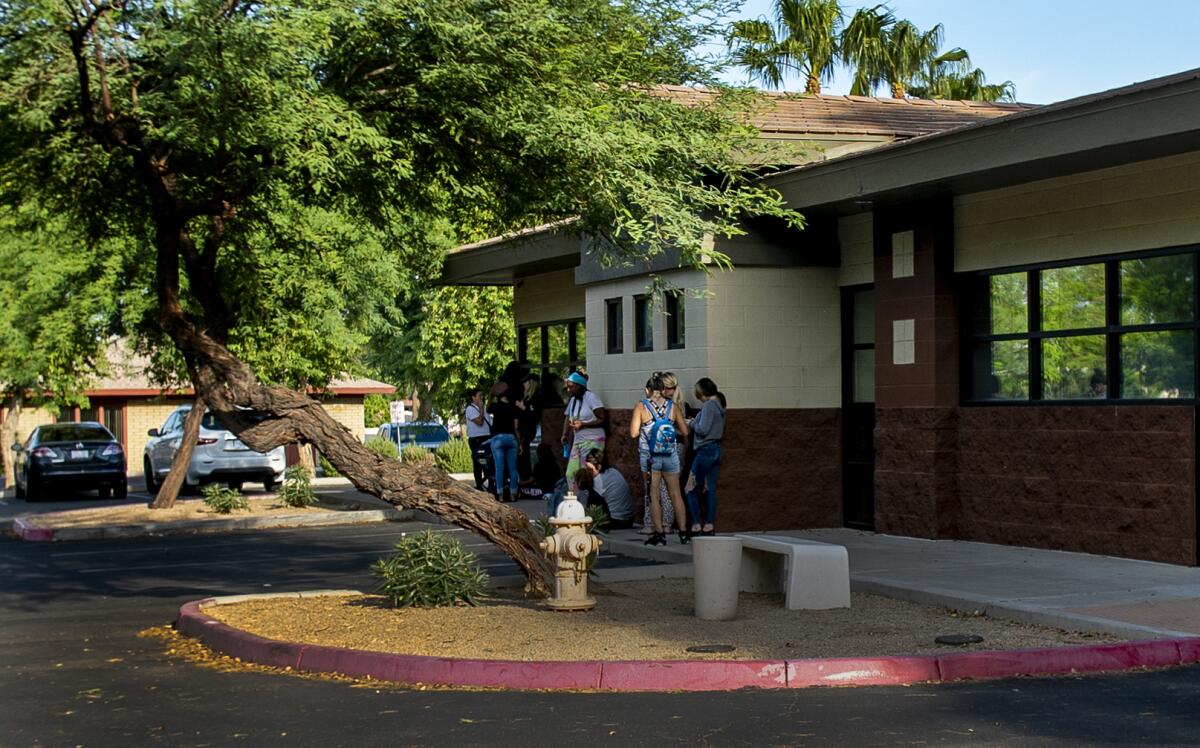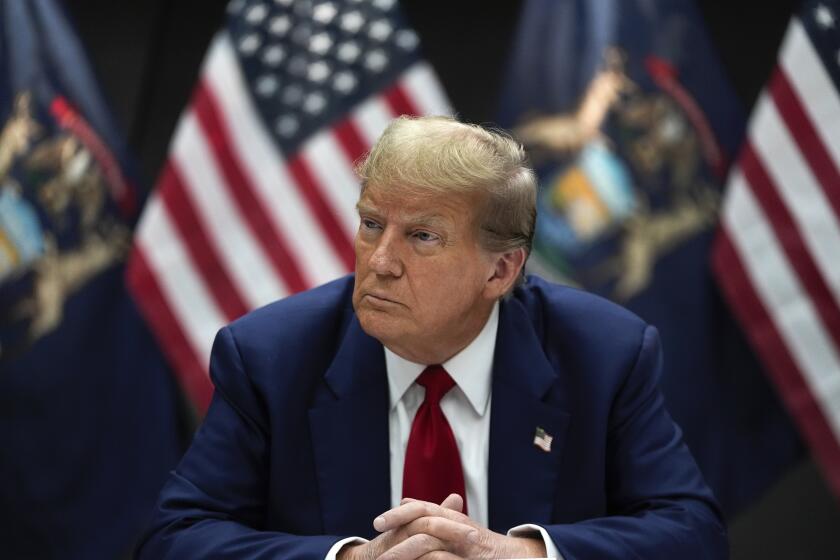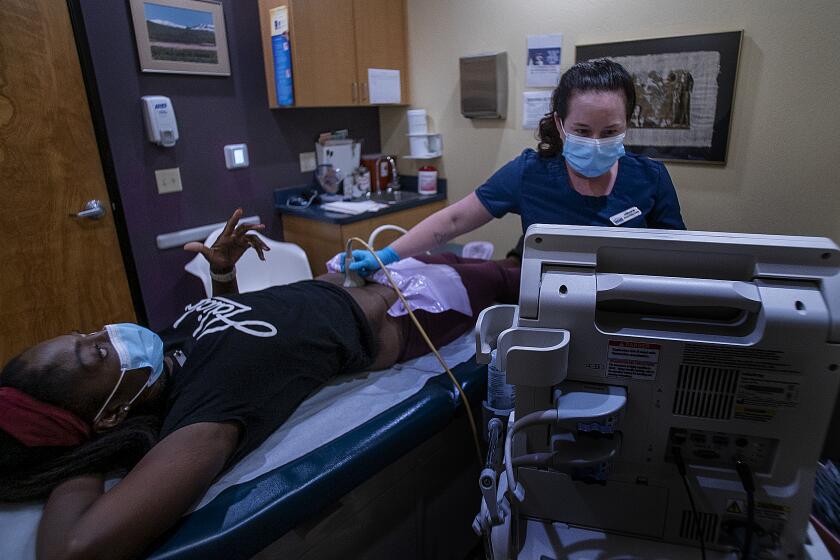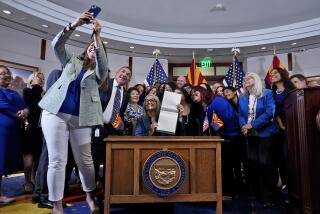Arizona’s ban on abortion sets up the swing state for an election 2024 showdown

With virtually all abortions in the state soon to be outlawed, Arizona has moved front and center in the national fight over reproductive rights that could help sway the election between President Biden and former President Trump.
The state’s Supreme Court set off political shock waves Tuesday when it reinstated a law from 1864 — decades before Arizona became a state — banning abortions except when the mother’s life is at risk.
In response to the ruling, Biden pointed out that the law was first put into place when Arizona was a territory — and long before women had the right to vote.
“This ruling is a result of the extreme agenda of Republican elected officials who are committed to ripping away women’s freedom,” the Democratic president said in a statement. “Vice President [Kamala] Harris and I stand with the vast majority of Americans who support a woman’s right to choose.”
Harris announced that she would visit Tucson on Friday as part of her “Fight for Reproductive Freedoms” tour. She released a video statement hours after the ruling, blaming Trump for Arizona’s law.
“It’s a reality because of Donald Trump, who brags about being ‘proudly the person responsible’ for overturning Roe v. Wade, and made it possible for states to enforce cruel bans,” Harris said in a statement.
The decision came one day after Trump released a video on social media announcing his current stance on abortion, saying he supports leaving the issue to states. He also took credit for appointing the conservative Supreme Court justices who would go on to vote to overturn Roe vs. Wade, returning decision-making power over the divisive issue to the states in 2022.
Asked on Wednesday whether Arizona had gone too far, Trump told reporters: “Yeah, they did. That’ll be straightened out. As you know, it’s all about states’ rights. It’ll be straightened out. I’m sure that the governor and everybody else are going bring it back to within reason.”
Arizona had previously banned abortions after 15 weeks. Advocates with Arizona for Abortion Access, a reproductive rights organization, say they have enough signatures to put a state constitutional amendment that would protect abortion access on the ballot. The group said Tuesday that it had collected well over the roughly 384,000 signatures required to put the measure before the state’s voters in November.
Trump said abortion access should be decided by the states. But that has been more complicated than it sounds.
The issue could prove pivotal in the election in Arizona, where Democrats make up 29% of the electorate and Republicans 35%. A recent KFF poll found that people who vote because they deem abortion the most important issue on the ballot lean Democratic.
The state high court’s ruling landed at 10 a.m., just minutes before Chris Love, a spokesperson for Arizona for Abortion Access, began a news conference in the state Capitol’s rose garden. Her voice cracking, she told supporters gathered that passing the ballot measure in November “is as critical today as it was yesterday.”
“Today is a clear example of what’s at stake,” Love said laterin an interview. “We still have a Legislature that is controlled by antiabortion folks, representatives. And at any point in time, they can do anything with the law. And so enshrining abortion in our constitution gives Arizonans the certainty that their rights are protected.”
The near-blanket ban goes into effect in about two weeks, and Love emphasized that people less than 15 weeks pregnant who are seeking abortions can still get them, for now.
The ban is expected to send Arizonans seeking abortions to Southern California.
“The last time abortion was unavailable in Arizona, right after the Dobbs decision [overturning Roe], we absolutely saw spikes in our volume,” said Sue Dunlap, chief executive and president of Planned Parenthood Los Angeles, one of the largest abortion providers in the nation. “I have every expectation, when this goes into effect, we will see dramatically more patients.”
After the U.S. Supreme Court struck down Roe in 2022, Dunlap said, abortions provided by the organization increased by 22%.
“I went to one health center parking lot, and one car after another was from Arizona,” she said.
Democrats seized on the ruling to push their abortion rights message — and to raise funds.
“Help us continue to fight for abortion access across the nation by electing fiercely pro-choice women,” Colleen Davis, endorsements manager of Her Bold Move, wrote in an email appeal for the group, which promotes female candidates who support abortion rights.
One Arizona abortion clinic — run by a crew of defiant women — has become a haven in the post-Roe vs. Wade United States.
Alice Stewart, a GOP strategist who worked on the presidential campaigns of antiabortion candidates such as former Rep. Michele Bachmann (R-Minn.) and former Sen. Rick Santorum (R-Pa.), said the day’s news would undoubtedly “motivate the pro-abortion crowd” — giving Democrats a needed boost in the swing state.
“The reality is those in the pro-life community that fought to overturn Roe vs. Wade, taking this issue out of the hands of unelected justices and putting it in the hands of elected legislators, need to realize that could mean the pro-choice community is going to win,” Stewart said.
She praised former presidential candidate Nikki Haley’s position on abortion during the GOP primary as a smart tactic — talking about “reasonable abortion limits, not abortion bans.”
“If the goal for Republicans is to broaden the electorate past Republican primary voters and appeal to independent voters and suburban women, there has to be a more nuanced position on abortion,” Stewart said.
Both Democratic and Republican candidates in the tight race for Arizona’s U.S. Senate seat condemned the ruling.
“I’m sorry to the women of Arizona,” Rep. Ruben Gallego (D-Ariz.) said in a video posted to social media. “The fact that women in Arizona now have less rights than they ever had, have no control over their bodies — it’s just inhumane. But we’re not done. The state Supreme Court has had their say. We will have our say.”
His most prominent Republican opponent, Kari Lake, a former newscaster and loyal Trump supporter who has supported abortion restrictions, said she also opposed the ruling. She called for the governor and state Legislature to “come up with an immediate common sense solution.”
Lake said she agreed with Trump that abortion “is a very personal issue that should be determined by each individual state and her people” — but she disagreed with her state’s ruling.
At a PBS debate during her run for governor in 2022, Lake said she believes that “life begins at conception.”
She also said: “I don’t think abortion pills should be legal.”
Love, with Arizona for Abortion Access, said she didn’t trust Lake’s statement Tuesday.
“Some of the antiabortion legislators that have been clear about their position for years and years are now trying to moderate that position. And I’m telling folks, don’t believe the hype,” Love said.
Arizona’s U.S. senators — outgoing independent Kyrsten Sinema and Democrat Mark Kelly — lambasted the decision as endangering women’s health and pressuring doctors.
“This is a really sad day for the state of Arizona,” Kelly said.
More to Read
Get the L.A. Times Politics newsletter
Deeply reported insights into legislation, politics and policy from Sacramento, Washington and beyond. In your inbox three times per week.
You may occasionally receive promotional content from the Los Angeles Times.














